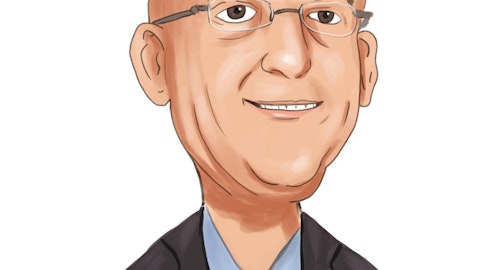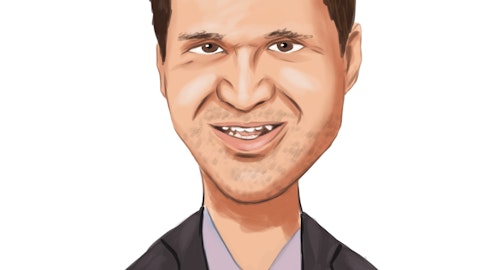Rodrigo Almeida: Perfect. Thank you.
Operator: The next question is from [indiscernible], Citibank.
Unidentified Analyst: Hello everyone. Thank you for taking my question. I have two questions. My first question, I want to know more details about imports. I think, it’s a very unique dynamic what we saw in quarter three much different than what we saw earlier this year and a return to normal levels which we haven’t seen since 2020. And what I want to know from you is that at this point in the quarter, we have a little more fat to be trimmed in imports and maybe a more open window looking forward with a stronger lineup for November and December. So I don’t know, if maybe Linden can help us, but I want to understand how this dynamics will change considering this scenario? It seems to me that a great part of this relevant improvement that you had in your margin has to do with supply and how the market has behaved and changed the way it behaves since last year.
And I don’t know, if I missed this part but can you talk more about the import dynamics in quarter three, how much it helped your sourcing with more competitive prices compared with the [indiscernible]. Can you give us more clarity that will help us better understand the results of Ipiranga? And my second point in other industries in particular in the field industry the tax issues are included. Maybe this is the main topic being discussed in the industry today the tax reform and yesterday they had their first win their first vote and their first win for the tax reform and there’s an important point which is the point about ethanol. I think, the exchange that everybody is expecting maybe the most relevant point of this tax reform relative to fuel is the point about ethanal and this could be game changing.
And I want to hear from you, how relevant it is for you and how could this affect your margin levels? Because since last year this wasn’t the case there was an improvement in the industry but this will cause a structural change in how this industry operates and this will affect productivity particularly for the three or four top companies in the industry. And how do you see this looking forward?
Unidentified Company Representative: Hello. This is [indiscernible]. Thank you for your question. Let’s try to put this in perspective and take a few steps that, I mean, look at this past in Ipiranga investor or one of the Ipiranga’s shareholders it’s very important to mention that the mill today operates at very low margins compared to the rest of the world. And the main reason for this is not an inefficiency of the distributors. There’s a lot of efficiency, but the main point here, but there is a part of this model, which is not operating according to the rules established with the government in terms of taxes and regulations and mixes. And this is in fight for us for who are complying with the law and responsibly working.
And we are trying — they are also trying to change the loss to simplify the loss so that they can be better enforced and inspected. Of course, this will improve collection by the government and it will also improve the level play field. It will more easily establish a conversion model that will be more homogeneous. So this is my first point. What we did not see during this period you talked about the margin. But if we always import products, we will always source enough products to meet the needs of our clients. For example, if our market share for our B2B clients our largest clients will always be supplied by Ipiranga. And many months before we deliver we are already preparing many and sourcing products for these clients. So even if the product was a little more heated in quarter three, there was no stock out for our clients and — but of course we have this phenomenon where we had some optimistic players.
And in quarter three, these are the optimistic players left the market and this created an additional demand, which ended up being met by the largest companies which were better structured and had more inventory. So it’s important to mention this. So as you said, if we look at the snapshot today we have a huge arbitrage for import. We don’t believe that will last long. It doesn’t make sense, that internal prices charge that refineries in Brazil are much higher than the international price. So this is just a matter of timing. We believe that there will be an adjustment in the short of nature. And that adjustment will cause a major loss of inventory for distributors including ourselves. This is part of the business. This always happens, when the price drops, it seems like we always gain when the price increases.
This is part of the business. So, if you ask me, what do I think? If I think that regulatory improvement will be impacting your margin, I’d say, that the margin will give a better return to investments made by the companies. For example, if you look at this math, a while ago when companies were running at 2% 3% 4% 5% 8% return on investment, it doesn’t make sense now with a CDI of 12% and a company that has this volatility with a return on investment of 6% 7%. So, it is just natural for a well-structured company that has an infrastructure, a strong brand and the outlet they should have a return of about 20%. So these adjustments these regulatory improvements should bring us to this scenario that I just described. And for consumers, it’s — the change is marginal.
For example, you’re going to have a net result of BRL1 billion or BRL130 billion. This means less than 1%. If it’s BRL2 billion it’s less than 2%. And in the end price to consumers, the change is marginal, but it is a brutal transformation for the industry in their category to invest, how much they can grow, how much they can improve their supply capacity and so on and so forth. So of course, my answer is more macro focused, but I think it’s important that we all understand these points.
Unidentified Analyst: And just a follow-up question, about the regulatory changes. One of the discussions that were raised recently, so maybe have a national operation for a few different picture. I know, it doesn’t sound like a first, but how did you — how can you mitigate this range?
Leonardo Linden: Well, I think it’s early to say. But if this is to reduce tax evasion and increase the efficiency of tax collection in Brazil, we can see that in a good light. But it’s too early to say. I don’t think that anyone today can truly know, what’s being built for the future. I think there’s a dialogue between the industry and the government right now, and this could take me to the future or not it’s too early. Thank you.
Operator: The next question comes from Bruno Montanari, Morgan Stanley.




